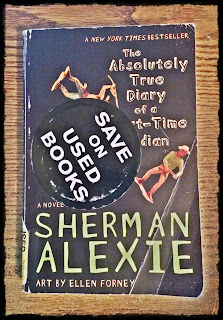 On the surface, this is just a story about Arnold, a Native American teenager and his experience attending a predominantly "white" school located outside of his reservation. However, below the surface, themes of racism, alcoholism, and oppression are evident in his everyday life. Historically, Native Americans have been stereotyped. This book sheds light into those stereotypical assumptions by providing an illuminating look into the culture as told through the eyes of Arnold. Vivid, powerful and eye-opening.
On the surface, this is just a story about Arnold, a Native American teenager and his experience attending a predominantly "white" school located outside of his reservation. However, below the surface, themes of racism, alcoholism, and oppression are evident in his everyday life. Historically, Native Americans have been stereotyped. This book sheds light into those stereotypical assumptions by providing an illuminating look into the culture as told through the eyes of Arnold. Vivid, powerful and eye-opening.The biggest take-away was learning about how an environment shapes and impacts an individual. Yet, something as simple as changing an environment can have a tremendous positive impact on the outcome of an individual's life. Administrators hoping to bring about real change need to read this book.
Poverty doesn't give you strength or teach you lessons about perseverance. No, poverty only teaches you how to be poor.Sherman Alexie is an award-winning author, poet, and filmmaker. He lives is Seattle.





